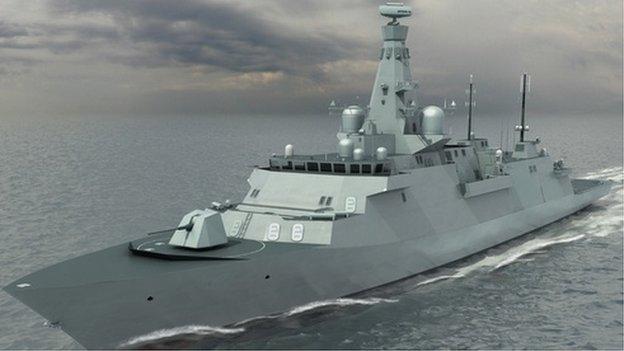BAE Systems reports rising profits
- Published

BAE is currently developing the new Type 26 frigate
BAE Systems, the defence, aerospace and electronics giant, has seen a rise in profits, even though its 2014 sales fell.
It has faced a squeeze on defence spending from its two biggest customers, the US and UK governments.
But it is expanding into provision of cyber security for major corporations, including banks and telecoms.
Operating profit was up from £806m in 2013 to £1.3bn, while sales were down from £18.2bn to £16.6bn.
Part of that fall resulted from reduced income from supply of Typhoon fighter aircraft to Saudi Arabia, and part was due to currency fluctuation.
With its annual results, its outlook for defence spending was upbeat, following the deal struck in January 2014 on the US federal budget.
'International markets'
It also noted that both Conservative and Labour parties plan a defence and security review after the UK election in May.
Ian King, the chief executive, said the company was well placed to plan ahead, having won contracts worth more than £10bn from the US and UK governments for three successive years.
He said: "Looking ahead, defence spending remains a high priority in a number of international markets. In the UK, we benefit from long-term contracts, notwithstanding continued pressure on public spending.
"We believe US budgets are now relatively stable, with some early indications of a modest improvement in 2016."
BAE Systems' annual results announcement said its UK maritime business was "robust".
It has much of the work in building two aircraft carriers and has a new £348m order for Royal Navy patrol vessels.
It is also developing the new Type 26 warship, being designed to replace the Royal Navy's frigates, and for export orders. The project has 700 people working on it.
Independence referendum
The Ministry of Defence plans to build those ships on the Clyde, with a demonstration phase contract expected this year and a full manufacturing order next year.
Meanwhile, BAE Systems has been considering options for its two Glasgow yards, with the favoured option a closure of Govan with a major investment in a covered yard at Scotstoun, on the north bank of the Clyde.
The company welcomed the 'No' vote in the Scottish independence referendum last year, which it said had the effect of "removing uncertainty for the group's employees and its business based in Scotland".
BAE Systems is also preparing for the building of a new generation of nuclear-armed Royal Navy submarines, with 1,400 people working on that project.
The UK government committed £389m in capital investment to prepare for the Successor submarine manufacturing programme.
Among the milestone achievements of 2014, the company listed the naming and float-up of the first of the Royal Navy's new aircraft carriers, the Queen Elizabeth.
Although it was doubted that the second ship would be put into service, the prime minister announced in October that it would be.
The earnings from that contract are scheduled to decline during this year, while submarine work is stepped up.
In the aerospace division, BAE Systems is also working on parts of the Typhoon fighter and F35 Lightning for Ministry of Defence orders.